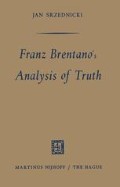Abstract
Most of the editors of F. Brentano’s works and his commentators have a tendency to attempt to arrest his thought at a given moment, and then to try to work out, in a systematic way, his views concerning most problems. So, for instance, Alfred Kastil (in Die Philosophie Franz Brentano’s, Salzburg, 1951) “…attempted to represent Brentano’s teaching in its final form…”2 The same tendency is clearly evident in, e.g., F. Mayer-Hillebrand’s edition of Die Lehre vom Richtigen Urteil, (Bern, 1956). In order to attain this objective, the editor used Brentano’s own writings, together with some writings of Hille-brand, and produced a systematic whole by skilful arrangement, subtle changes and additions. The effect is to present Brentano’s views in the form of a detailed and systematic theory.
Access this chapter
Tax calculation will be finalised at checkout
Purchases are for personal use only
Preview
Unable to display preview. Download preview PDF.
References
This section appeared first as an article: Remarks concerning the interpretation of the works of Franz Brentano in Philosophy and Phenomenological Research, March, 1962, vol. XXII, No. 3. Thanks are due to the editors of this journal for their kind permission to reprint it here.
Comment of the editor F. Mayer-Hillebrand; p. 6. (My translation).
Ibid., p. 9. There is also a tradition by word of mouth strengthening and reasserting these requests.
Dumont took a number of Bentham’s paper written separately at different times and edited them by placing them together in an order, deleting parts of them, etc. This resulted in a systematic statement of the theory of legislation, such as Bentham himself never produced.
See Psychologie.
It must be remembered that F. B. thought of XIX century science.
Here is the text of the letter as quoted by Kastil on p. 9 of Die Philosophie Franz Brentano’s: “…Sie deuten an, welche Aufgabe Sie sich in Bezug auf von mir hinterlassene Manuskripte gestellt haben. Ich weiss nicht, inwieweit ich solche Publikationen überhaupt für wünschenswert halten kann. Besser wäre es jedenfalls, wenn etwas geschähe ähnlich dem, was Etienne Dumont gegen-über Benthams Manuskripten getan. Marty hat mich in meiner Enthaltung von Veröffentlichungen und endgültiger Redaktion gar manchmal mit Bentham verglichen. Aber was nach dem Tode Benthams herausgegeben worden ist, wollte J. St. Mill schon darum Dumonts Schrift nicht gleichwertig erachten. Die Vorsehung, die immer weise ist, hat vieles anders gefügt, als wir es ratsam befunden hätten. Aristoteles’ Metaphysik is nicht zur Ausführung gekommen und keine der uns überlieferten Schriften zur endgültigen Redaktion. Bei mir scheinen aussere Umstände neben vielem anderen, was meine Arbeit erschwert, es ähnlich dahin kommen zu lassen, dass gar manches, was ich meinen Mitbrüdern Gutes hatte geben können, verloren geht. Es wäre eine törichte Selbstüberschätzung zu glauben, dass dies einen unersetzlichen Verlust bedeute.”
It would appear from the letter (from 13.1.61) that Brentano was in earnest, concerning this way of editing his work, and I am certain that he thought this best in the circumstances, i.e. taking into account the state of his manuscripts, and the attitude of his followers. I would be incredulous however if it was maintained that he was in earnest thinking that this would represent his achievements most faithfully. His arguments are significant here: Argument 1 — Perhaps it is not really important to edit my works at all. Argument 2 — Even if something is lost from my achievements, “Es wäre eine törichte Selbstüberschätzung, zu glauben, dass dies einen unersetzlichen Verlust bedeute.” Argument 3 — It would be better to do something like Dumont — even if J. S. Mill would not allow this to be rated equal with careful posthumous editions of Bentham’s work; but it has some other value as well. All this points to the fact that Brentano thought that this may be the best way of carrying on his tradition, but not to the fact that he thought this the best way of representing his writings. He would have thought that to carry on the work and the tradition is much more important than to prepare a detailed and scholarly faithful edition of his writings. 9 See also (c).
See the letter quoted, footnote 6.
Theory of Legislation, quoted in the Introduction by Ogden, p. xiix.
Die Philosophie Franz Brentano’s.
See O. Kraus, Franz Brentano, p. 32. I reproduce only part of what is quoted by Kraus (translation mine).
He says, for instance, (Foundations of Mathematics, p. 142): “…the problem is not as to the nature of truth or falsehood, but as to the nature of judgement or assertion…”
For this attitude with respect to the concept of true’ sentence’ and ‘true’, see Alfred Tarski, LSM, p. 155 ff.
Compare here the first part of Austin’s contribution to the symposium in A.S.P., Supp. Vol., 1951.
Compare here Brentano’s discussion of judgement in L.R.U. and Psych. Vol II, Ch. 7, (3), also Anhang. If the whole subtlety of Brentano’s final position is taken into account, his view appears plausible, but I still feel that the terminology is at best misleading.
See here Psych. II, p. 179 ff.
Anerkennen und Verwerfen — love and hate characterise value judgements.
‘Regelmässig’ and Regelwidrig’ are stronger than ‘orderly’ and disorderly — there is the suggestion of obeying or defying the proper order of things.
Indicated, that is, by the expressions that we apply and by the way in which we apply them.
Kas., p. 28. Translation mine.
Anschaulich.
Fortschritt.
Author information
Authors and Affiliations
Rights and permissions
Copyright information
© 1965 Martinus Nijhoff, The Hague, Netherlands
About this chapter
Cite this chapter
Srzednicki, J. (1965). Introduction to Franz Brentano’s Philosophy. In: Franz Brentano’s Analysis of Truth. Springer, Dordrecht. https://doi.org/10.1007/978-94-011-9094-7_1
Download citation
DOI: https://doi.org/10.1007/978-94-011-9094-7_1
Publisher Name: Springer, Dordrecht
Print ISBN: 978-94-011-8393-2
Online ISBN: 978-94-011-9094-7
eBook Packages: Springer Book Archive

